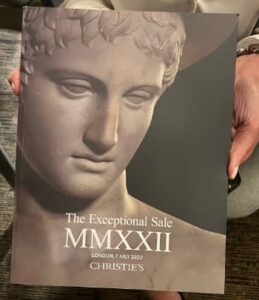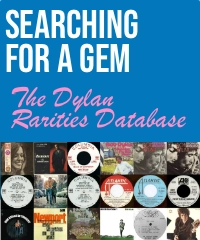<< Back to Blog
You Can’t Afford Dylan’s New Blowin’ In The Wind, But That’s OK (Ionic Pt.3)
This is part of our series of posts on T-Bone Burnett’s new Ionic Originals, written following the Christie’s listening event in NYC for the upcoming “Exceptional Sale”. Part I discussed the recording and performance, Part II the session and the technology, and today in Part III the business issues including price and scarcity.
Suppose you woke up one morning and read the following:
Bob Dylan went to the studio to record with T-Bone Burnett (yea!), he re-recorded some of his old songs with some phenomenal musicians (awesome!) and the resulting performance and recording is beautiful (tears!) and available only on a new medium that delivers better sound quality than vinyl ever could (wow!), and this new format is simple to care for and clean (Yes!) and requires no new equipment to be heard (unbelievable!).
Every Dylan fan in the world would be over the moon, right? Every music blog and publication would be covering this remarkable and historic and transformative event (for both Dylan fan and ultimately all music fans). The vinyl press and community especially would be euphoric – right?
Nope.
Two Important Details
To be fair, I’ve left out two details some people seem to find important:
- There is exactly one copy of this recording in the world. It’s unclear if there will ever be another copy. It’s possible on a very few people will ever hear it.
- This copy is being auctioned by Christie’s and the estimate sits at roughly $750,000 to $1,250,000. The auction could fail, or it could dramatically exceed these estimates.
The fact that everyone can’t hear or have a copy, and/or that it is being sold for a huge sum and therefore going to be owned by and available to a wealthy person, is a ‘blood in my eyes’ moment for some. Both T-Bone and Dylan have been called out for being money hungry, selfish, egotistical, and worse.
These fans seem to be hurt, offended or saddened that every note of Dylan’s music isn’t ‘for the people’ and in this case is being used in what they see as an ‘elitist’ endeavor. And most critically, they they don’t get to hear it.
A least part of that is an understandable if emotional reaction. We Dylan freaks want to hear everything. We go to great lengths to do so. Chasing rarities is fun, and hearing something new/different is often amazing. There is no way to argue with that desire or the disappointment this announcement may cause.
Good news: I think you’ll all get to hear it, for reasons explained below. I think saying you won’t was a huge unforced error. More on that later too.[/vc_column_text][vc_column_text css=”.vc_custom_1655585335606{padding-right: 30px !important;}”]
T-Bone’s Goals
Let’s assume for a moment that nobody but the buyer (and preview attendees) will ever hear it, and yet put cynicism and childishness and just plain trolling aside and look at the facts we have at face value.
T-Bone seems to have four goals:
- ‘Discover the value of music’ in a world where it may be undervalued
- Give artists a new and significant revenue opportunity,
- Fund the development of his company
- Get this technology (a better sounding vinyl alternative) into the world
The first is philosophical, the second is benevolent, and last two are practical. Each is an important and valid reason to figure out how to push this forward. Let’s look at each more closely, what it is and how the path he’s taking moves towards it.
.
Discovering The Value of Music
Give Artists a New Revenue Opportunity
T-Bone spoke passionately about the way music is valued in our culture. “Recorded music is the product we (the US) create that has the greatest influence on the world, the most valuable thing we do as a culture” he said, “and yet it is incredibly under valued.” He cited the decline in revenue to artists, the increasing importance of selling ‘merch’ and generally about the struggle we all know well. He pointed to the fact that the $22B music industry is dwarfed by the $500B cosmetics industry, and happens to align with the the size of the Lipstick market. “You have to wonder about a culture that values music the same as it values lipstick,” he mused.
Then he announced a very specific intent: “We’re going to begin work with Bob and other artists to help develop a music space in the fine arts.” This had been hinted at before, but frankly it surprised me. This is not a publicity stunt or a one-time event, it’s an effort to create some genuine scarcity and value in the music world, which would generate serious money for (some) musicians and perhaps create a level of cultural value that (some apparently believe) musicians lack today.
The premise here is that it’s fine for these artists to create one-of-one pieces of work, and sell them for a ton of money. Why should a painter be able to do it (make millions in one go) and not a songwriter? There clearly is no reason other than tradition. Music NFT’s, which are a whole different animal, are allowing some musicians to fund themselves and projects that otherwise wouldn’t be possible. The current system doesn’t work, the times they need a’ change-in. We’ll see if artists and fans (as well as high-end collectors) go along.
Thought experiment: Take some artist who doesn’t have millions in the bank – I’ll pick some I like: Graham Parker, Hayes Carll, Mike Scott, Sarah Jaroz – folks who have uber-passionate fans and are (largely) critically adored, but have to work and at least have financial considerations drive their artistic / career decisions. Suppose they could cut a few one-of-one or strictly limited edition music (new songs or versions) and sell them for $10K to $200K, enough to substantially change their lives and grant them (more) artistic freedom. If Hayes Carll can suddenly spend more time writing and less touring, or produce a higher quality album all because 5 rich dudettes paid $75K each for some One-Of-One songs, I’m better off not worse.
Be it NFTs or Ionic Originals or Royalty Share Pre-Sales or something else, the music industry needs this. It’s gonna happen. To say artists shouldn’t be able to achieve financial freedom (personal or artistic) by using their own work-product is a pretty extreme position to take. Nobody wouldn’t say that to a plumber.
I believe this is what T-Bone is trying to enable by opening up the ‘art world model’ to music. More power to him.
.
Fund His Company
Someone paid for three years of development, probably T-Bone, maybe he has some investors. Startups are hard, and expensive, and VC’s don’t fund great ideas or promising technology they fund likely economic returns. Trust me, nobody is lining up to invest early on ‘a new way to make vinyl sound better’. Nearly every ‘high fidelity’ effort has failed and broadly nobody cares anyway.
T-Bone has developed a technical innovation. These discs have great characteristics. Is he more likely to get $10M by selling 200 thousand units at $150/ea (not expensive for high end vinyl, see MoFi) earning $50 profit on each, or selling 20 one-of-one records by his superstar friends for $2M each and earning $500K on each. It’s the latter.
Selling 200,000 high end vinyl units would require Ionic surpass the current market leader (MoFi). It would take a dozen or so recording sessions with different artists, a huge distribution channel, and marketing. All of that would likely cost $10M or more. The rarities/auction path – given his unique situation and ability to make it happen – is a vastly easier and safer financing strategy. Plus as soon as it works, *then* he can attract real equity investment, perhaps $100M, easily. This will seem far more repeatable and grow-able then selling a bunch of $200 vinyl.
He needs to fund the company to improve the technology to commercialize the technology to democratize the technology. If the company fails nobody wins. As founder he needs to take the safest, quickest path to funding the company, and as listed here has has other goals too. I think it’s important to consider that Dylan (one can safely presume) wants this company to succeed. I think the other artists who sign up (and there will soon be more, I believe) are also doing it in part to help the company succeed.
.
Get This Technology Into The World
T-Bone explained that there will be more One-Of-One recordings. He also said there will be ‘small batch’ limited editions (presumably still expensive but likely much less so). He also said (paraphrasing): once we get this sale done, the some upcoming projects, in the future I’m up for anything.
He has not said this technology will only be used for million dollar one-of-ones. He cares about improving the music we all hear and that is not accomplished by selling rich people musical rarities; but it likely isn’t accomplished without doing it either.
That is I think the main point those against this need to really reckon with: would you really rather kill this technology and prevent it from eventually being available broadly, just to prevent artists from selling some expensive rarities? If so, I’m glad you’re not the one making that choice.[/vc_column_text][vc_single_image image=”15997″ img_size=”large” alignment=”center” css=”.vc_custom_1655583355165{margin-top: 20px !important;margin-bottom: 20px !important;}”][vc_column_text css=”.vc_custom_1655581907919{padding-right: 30px !important;}”]
Let Everyone Listen
T-Bone seems to believe that he can only achieve all four of his goals by taking this ‘auction as exclusive’ path; giving the record the caché of being a one-of-one copy and selling it for as much as possible. Would the one-of-one be worth exactly as much if the same recording was on Spotify? Maybe but probably not. And from his perspective (and Dylan’s) why take that chance?
There is probably a secret fifth goal too: not sell this technology to a major label, at least yet. Sony could certainly introduce this broadly, the same way they did the Betamax and the CD and the SACD. They likely wouldn’t be selling the first copy for $1 Million. But they also would immediately dump goals #1, #2, and #3. No prestige for music, not money for artists, no T-Bone doing this the way he wants to do it.
Rarity, exclusivity, bragging rights, prestige, access to fame and power these things are all important. They exist throughout our society. Expecting T-Bone and Dylan to eschew them is not realistic. Commercial/economic reality is driving these decisions. That’s business. That’s life.
And consider this: T-Bone is trying to improve almost every aspect of the music industry at the same time – respect, earnings and quality. Let him use all the tools at his disposal to succeed.
Scarcity
It’s somewhat strange for people to be inflamed about scarcity and high value when there are already endless rare objects and recordings that either don’t circulate or cost a ton.
We live in a society full of artificial scarcity – from a 2,500 copy limit on MoFi pressings to Ltd Edition sneaker drops. We’ve socially accepted artificial scarcity. So maybe that’s not the issue. Nobody gets upset when a Rolling Stone manuscript or Bob’s Newport Stratocaster sell for $2M. What’s different?
Music. The people who are pissed feel that way because they are being told ‘you can’t hear this’. That hurts. Worse, you can’t hear this because you can’t afford it. For some, that hurts in a whole different way. Music may not generate the dollars of fine art ($50M/year) but global passion could be measured, I think music would dominate by 100x or more.
A more important truth is that it’s a small number of people who care about this, but they care very deeply. Like the copyright collection drops, this song could circulate only via backchannels and everyone passionate enough to be pissed about it would have it, yet officially it could still be unreleased.
That’s probably the way this ends up when the shouting is over anyway.[/vc_column_text][vc_single_image image=”15995″ img_size=”large” alignment=”center” css=”.vc_custom_1655583361651{margin-top: 20px !important;margin-bottom: 20px !important;}”][vc_column_text css=”.vc_custom_1655643470153{padding-right: 30px !important;}”]
Tangled Up In Bad PR
What I hope I’ve presented in this series is a much clearer picture of what Ionic is doing, and how, and why. This is a beautiful new Dylan recording, stunningly rendered, on impressive new technology, all in the service of four admirable goals – with an approach and business model that makes sense. Yet broadly, nobody knows any of that and the ‘buzz’ in negative.
It didn’t have to be that way. This could have been handled differently.
First, these announcements should have been sequenced, and explained far more clearly. They should have first announced and previewed the technology with listening events for music press and vinyl people in a few major cities – touting the breakthrough technology and answering all questions. Explain that it’s super expensive right now but it’s just an early preview. Let the press and vinyl-holics understand and accept it, and build desire.
Then a few months later, announce that there will be early special editions, some one-of-one, some limited, with huge stars, new recordings, and explain the goal of creating *both* an art market for music and a whole new revenue stream for non-superstar artists. Name some ‘A’ and ‘B’ and ‘C’ artists who will be in the first class of participants. Market these two ideas (respect and revenue) – get 100 articles written discussing the state of artist economics and the relative value of music to art or whatever – and let them sink in.
Then another few months later, announce Dylan. “You know that cool technology that improves vinyl you’re all salivating for? Remember our goal of valuing music and helping artists earn that you saw on 60 Minutes and the Today show? Well Dylan has agreed to help us kick it off. We’re going to auction off the first one-of-one, for $1M bucks or more, and Dylan’s $250K royalty is going to some songwriter fund (maybe MusicCares). This cool exclusive thing and event is enabling the tech, establishing the high-end music collectible market, but also paving the way to artist revenue, and helping us fund this company so Sony doesn’t own it and we can expand access to it very soon.”
And one more thing: Announce that the recording will be released on other formats in 2 or 5 years. I think it’s the ‘never’ that is pissing everyone off. It seems unlikely that the recording actually makes it anywhere near that long without getting out – because the owner will play it for people and because people are people. Or some other way. And if it’s gonna get out anyway, why take the hit for saying ‘you can never hear it’?
I think there would be cheering all around.

Hindsight is easy. T-Bone isn’t a startup veteran (although he is certainly an entrepreneur and a capable business person). The backlash (which may be small) and more importantly the indifference (these posts were the only new items in Google about this topic AT ALL for the last week) suggest this could be going better.
I think it will turn around. That the four goals will become clear and that eventually they will all be accomplished. I think that the auction will be a success (I really hope it is) so this can come to pass. There will be high end music collector market, there will be a new way for artists to make money, Ionic will stay independent (for a while), and most importantly we’ll see increasing numbers of records (or discs anyway) in this new format offering better sound, no scratches, less cleaning issues, and a lower sound floor.
And I think the Dylan recording (and all future recordings) will leak and we’ll all get to listen in the quality at our disposal. Just like there are art prints (and t-shirts) that don’t make a Warhol any less valuable, a Flac or an MP3 won’t take away from an Ionic Original.
But ‘only copy in the world’ sounds better.

Craig Danuloff
Craig is the founder of Freak Music Club. He is a technology entrepreneur, a one-time concert photographer, and avid audiophile. Currently residing in New York City.
The FM Podcast Network Shows
- Dylan.FM
- The Dylantantes
- Infinity Goes Up On Trial
- Watching The Covers Flow
- Pod Dylan
- The Bob Dylan Primer


